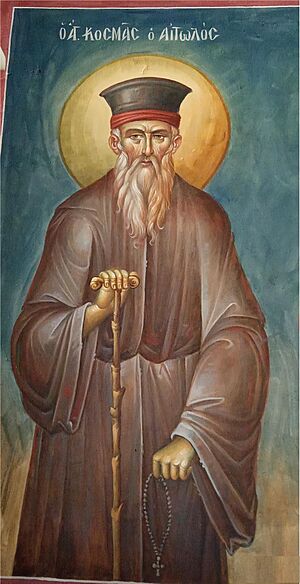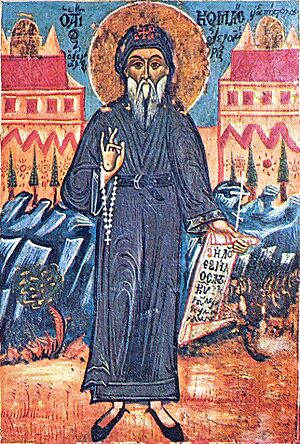Kosmas the Aetolian facts for kids
Quick facts for kids SaintKosmas the Aetolian |
|
|---|---|

Mural painting of Saint Kosmas
|
|
| Equal to the Apostles and Teacher of the Greek Nation | |
| Born | c. 1714 Aetolia |
| Died | 24 August 1779 Kolkondas, Pashalik of Berat in the Ottoman Empire, now in Fier District, modern Albania |
| Venerated in | Eastern Orthodox Church |
| Canonized | 20 April 1961 |
| Major shrine | Metropolitan Cathedral of Athens |
| Feast | 24 August |
Kosmas the Aetolian (born around 1700-1714, died 1779) was an important monk in the Greek Orthodox Church. He is known for starting religious movements in Greece. He is also remembered for his predictions about the future. Kosmas encouraged people who spoke other languages, like Aromanian and Arvanitika, to learn and use Greek.
Saint Kosmas is called "Equal to the Apostles" because his work was similar to that of the first apostles. He was officially made a saint by the Orthodox Church of Constantinople on April 20, 1961. His special day, or feast day, is celebrated every year on August 24. This is the day he died for his beliefs.
Contents
His Early Life and Studies
Kosmas was born in a Greek village called Mega Dendron. This village was located near the town of Thermo in the area of Aetolia, which was part of the Ottoman Empire at the time.
He studied Greek and theology, which is the study of religious faith. After his studies, he became a monk. He traveled to Mount Athos, a famous center for monks. There, he also attended the local Theological Academy.
Becoming a Missionary
After two years, Kosmas left Mount Athos. He spent some time in Constantinople, where he studied rhetoric, which is the art of speaking or writing effectively.
In 1760, Patriarch Serapheim II gave Kosmas permission to travel and teach. The Patriarch was worried that many Christians were converting to Islam in certain areas. Kosmas began his missionary tours in villages in Thrace. Later, his travels extended to areas that are now West Greece and Northern Greece.
Teaching and Building Schools
For more than sixteen years, Kosmas traveled widely. He helped to establish many church schools in different villages and towns. He strongly encouraged Christians to set up schools. He wanted people to learn Biblical Koine Greek. This would help them understand the Bible better and become more educated in general.
Challenges and Opposition
After a big event called the Orlov Revolt in 1770, Kosmas began preaching in what is now Southern Albania. This area was then ruled by Ahmet Kurt Pasha.
Kosmas's teachings sometimes caused problems. Wealthy and powerful people felt threatened by his message. This included local leaders called kotsampasides, whose power was linked to the Ottoman government.
Officials from the Venetian Republic also viewed Kosmas with suspicion. Venice was losing its power at the time. In 1779, Kosmas visited the Venetian-ruled town of Preveza. He founded a Greek school there, which was the only school in the city during the 18th century. Venetian authorities might have seen this as a challenge to their rule. Spy reports about Kosmas are even kept in Venetian records.
However, Kosmas also had a lot of support. Many Christians admired him, and even some Turks supported his work.
Views on Language and Trade
In his sermons, Kosmas often spoke about different groups of people. He believed that anyone who wronged Christians, Jews, or Turks would face consequences for their actions.
Kosmas had strong opinions about the use of languages like Aromanian and Albanian (Arvanitika). He urged people who spoke these languages to stop using them and to adopt Greek instead. He even promised that God would forgive the sins of those who vowed never to speak Aromanian again. He also said he would "curse" any village where he found people speaking Aromanian. He made similar promises to Arvanites, calling their language "the language of Satan."
One of the changes Kosmas encouraged was moving the weekly market, or bazaar, from Sunday to Saturday. This change caused financial difficulties for Jewish merchants. Their religion prevented them from doing business on their holy day, the Sabbath. Some historians believe that Jewish communities in the region of Epirus might have been involved in his arrest by the Ottoman authorities because of this.
His Arrest and Death
Kosmas was accused of being a Russian agent. Ottoman authorities arrested him. On August 24, 1779, he was executed at Kolkondas, in the Fier District. This place is near the mouth of the Seman River in what is now Albania.
There were no official charges against him, and he was not given a trial before his execution. Because of this, many theories exist about who wanted him dead and why.
His Lasting Impact
In 1813, Ali Pasha, a powerful Albanian ruler, built a church near where Kosmas was executed. Kosmas's remains were placed in this church.
In 1984, his remains were moved from the St. Kosmas' Monastery to the Archaeological Museum of Fier. Other important items belonging to the saint are kept in the Metropolitan Cathedral of Athens. Saint Kosmas is also honored by some Greek nationalist groups. These groups are connected to the idea of Northern Epirus joining Greece. Even though he encouraged people to adopt Greek culture, Saint Kosmas is still highly respected by Orthodox Albanians for his religious message.
His Writings and Prophecies
Many popular religious texts are believed to have come from Saint Kosmas. The most famous are his five "Didaches" (teachings) and his "Prophecies." It is said that he predicted the unification of Greece and Epirus.
However, there are no original copies of these texts written by Saint Kosmas himself. None of the existing copies can be dated with certainty to his lifetime. His writings are known only from copies made by others, often after his death. It is believed that these texts are based on what Kosmas preached, but they were written down and copied mostly after he died.


